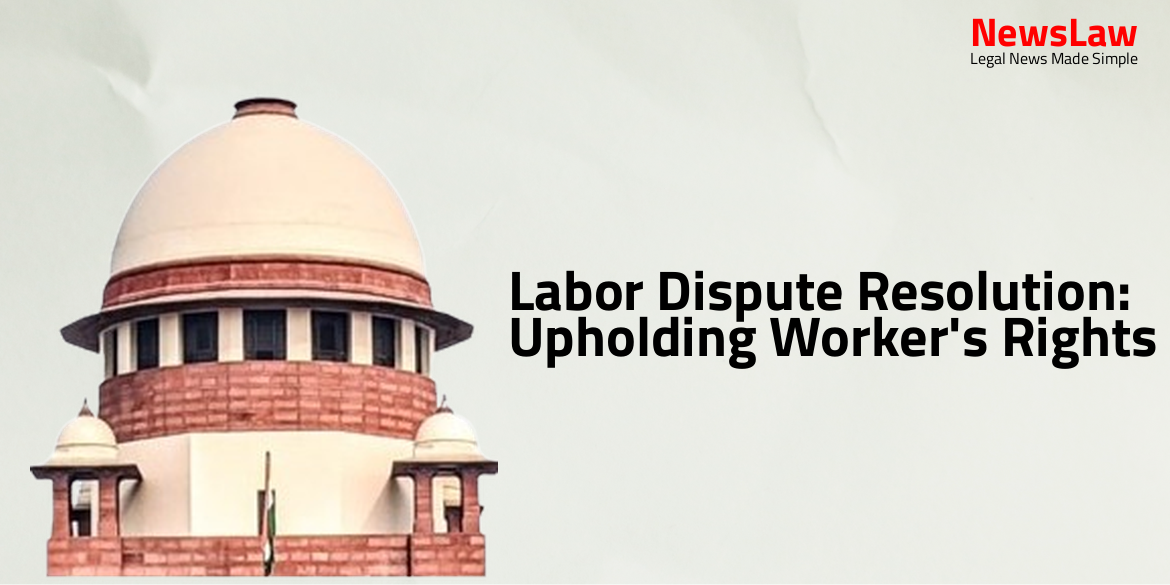In a recent case before the Delhi High Court, a labor dispute involving the rights of the workman was adjudicated upon. The court ruled in favor of the workman, ordering the management to pay compensation as awarded by the Labour Court. This decision is a significant step towards upholding the rights and protection of workers in the labor sector.
Facts
- The Labour Court failed to appreciate that the workman has always been receiving the salary designated for unskilled work without any objection during his service.
- The Industrial Tribunal’s judgment in the designation case does not provide a “skilled” designation as per the scheduled employment for the workman.
- The workman’s salary has always been in line with the wages for unskilled workers.
- The workman has not raised any objection regarding his designation during his employment.
- The Labour Court wrongly referred to judgments unrelated to the present matter.
- The Union did not show urgency in seeking stay of the award, indicating lack of concern from either party.
- The workman was retrenched in violation of Section 25-F of the Industrial Disputes Act, 1947.
- The learned Labour Court decided in favor of the respondent workman and against the petitioner entity.
- The workman was awarded a lump-sum compensation of Rs.200,000/- to be paid within one month failing which interest of 9% per annum would apply.
- The Labour Court only considered the meager amount of relief of Rs.200,000/- plus interest, despite the designation of skilled and semi-skilled worker conferred by POIT.
- The issue of back wages was to be decided by the High Court at the time of final decision of writ petitions.
- Management calculated retrenchment compensation based on last drawn salary, not taking into account the wages of skilled and semi-skilled workers as ordered by POIT.
- Management included the period from transfer till rejoining in total working period for calculating retrenchment compensation, which was deemed unjustified by the Labour Court.
- Sections 9A and 25-N of the Act were deemed inapplicable in this case by the Labour Court.
Issue
- Issue No 2: Whether the stayed award of the Industrial Tribunal could be relied upon by the learned Labour Court to hold the respondent entitled to compensation.
- The Workman concerned was receiving the salary of “unskilled” labor from the date of appointment until the time of retrenchment.
- The Court framed two main issues for consideration: termination of services and retrenchment in violation of Section 25F of the Act, and reliance on the stayed award of the Industrial Tribunal for compensation.
- The key question for adjudication is whether the award of the Labour Court should be reviewed under Article 226 of the Constitution of India.
Arguments
- The award dated 29 September, 2009 was in operation when the workman was illegally retrenched on 5 May, 2010.
- The petitioner argues that the judgments cited by the Labour Court are not applicable as they differ from the current case.
- The petitioner claims the workman was willing to work but was kept away without valid reason.
- The petitioner argues that the impugned award was based on a previously stayed award and should not have been passed.
- The petitioner asserts that the workman never raised any objections regarding his designation or wages during his service.
- The petitioner highlights that the management took back the workman only to avoid liability under a specific section of the Act.
- The petitioner contends that there was no malafide intention in the retrenchment compensation paid.
- The petitioner argues that the impugned award was in accordance with legal principles and due procedure.
- The petitioner asserts that it is not within the scope of the court’s jurisdiction to reevaluate the evidence and set aside the award.
- The petitioner claims that the workman is being penalized for forming a union and seeking redressal for grievances.
- The petitioner argues that any disputed amount in designation matter could be paid if the management falls.
- The petitioner emphasizes the workman’s long service of 16 years and his current inability to find a job at an advanced age.
- The petitioner challenges the findings of the Industrial Tribunal regarding transfer orders.
- The petitioner submits that the impugned award should be set aside due to errors in considering the facts and circumstances.
- The Ld. ARM argued that designation for the claimant has been stayed due to correct calculation of retrenchment compensation and notice pay based on last drawn wages, not as per the award of 29.09.2009.
- The unchallenged award of 29.09.2009 operates as res-judicata as it is final.
- Claimant’s case against transfer resulted in a finding by POIT that the claimant was performing an unskilled job.
Analysis
- The Industrial Tribunal held that the workmen were entitled to designations they claimed and were working in skilled and semi-skilled categories.
- The Labour Court observed that for lack of compensation due to the workman, the retrenchment violated Section 25F of the Act.
- Seniority list was displayed on the notice board and sent to the Labour Department.
- The workers filed a case against transfer which the POIT found illegal.
- The transfer case did not address the skilled or unskilled nature of work.
- The workman was deemed to belong to the unskilled category and had not disputed wages or designations during employment.
- The compensation was awarded based on the skilled designation despite a stay on the earlier award.
- The retrenchment compensation was incorrectly calculated based on the unskilled designation rather than the skilled or semi-skilled category as per the 2009 award.
- The management was found to have violated Section 25-F of the Act by not ensuring correct compensation.
- The Industrial Tribunal awarded only designations to the claimant in the transfer case.
- The workman failed to provide evidence contradicting the management’s records.
- The issue of transfer was not within the 5th Schedule list of matters under Section 9A of the I.D. Act, 1947.
- The Labour Court’s decision was based on evidence and did not exceed its jurisdiction.
- The workman retrenched before the stay was entitled to compensation as per the designation decided in 2009 by the Industrial Tribunal.
- The management proved the display and submission of the seniority list as required by rule 76A.
- The contention that management violated certain sections as they were not applicable was rejected by the Court.
- The workman was entitled to skilled/semi-skilled wages which were not paid by the management.
- The court discussed the effect of stay on adjudication in the case Shree Chamundi Mopeds Ltd. v. Church of South India Trust Assn.
- It was observed that when an operation of a notification is stayed, no surcharge can be demanded upon the amount withheld.
- A repeal puts an end to the law, and once proceedings are quashed, the parties should be restored to their original positions.
- The court cited various judgments emphasizing the duty to restore parties to their rightful positions after the dismissal of substantive proceedings.
- The court explained the distinction between a repeal and suspension of a law, stating that repeal removes the law entirely while suspension retains its existence but with certain aspects suspended.
- The legal maxim ‘actus curiae neminem gravabit’ applies, stating that an act of the court shall prejudice no man.
- Various cases were cited to support the principle of restitution and the obligation of parties to fulfill their duties once the stay is lifted or proceedings are dismissed.
- Section 25-F of the Act outlines conditions for retrenchment of a workman.
- Employer must give one month’s written notice or pay wages in lieu of notice.
- Compensation equivalent to fifteen days average pay for every completed year of service or part thereof in excess of six months is required to be paid during retrenchment.
- Notice to the appropriate government is necessary for a valid claim for compensation.
- Workman must have been in continuous service for at least one year with the employer.
- The Labour Court found that the petitioner management had illegally retrenched the workmen without proper compensation.
- The management failed to present any compelling arguments in their favor.
- The Court found no merit in the petitions and upheld the Labour Court’s findings.
Decision
- Petitioner management directed to pay compensation as awarded by the Labour Court to the respective workmen within three months.
- The batch of petitions is dismissed.
- Management ordered to pay Rs.2,00,000/- to the workman within one month from the date of publication of the award.
- If payment is not made within the specified time, interest of 9% per annum will apply.
- Costs to be borne by parties individually.
- Award passed accordingly.
- Copies of the award to be sent to the Govt. of NCT of Delhi for publication.
- File to be archived in the record room.
- Issue before the Labour Court was the legality of the workman’s retrenchment.
- Impugned award upheld by the Court.
- Pending applications dismissed.
- Judgment to be uploaded on the website immediately.
Case Title: SAWHNEY RUBBER INDUSTRIES Vs. SH. ANIL PRASAD (2024:DHC:4569)
Case Number: W.P.(C)-6065/2020



